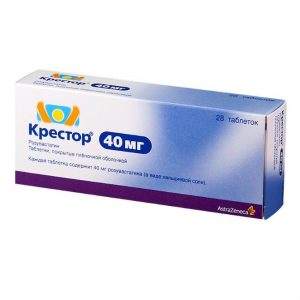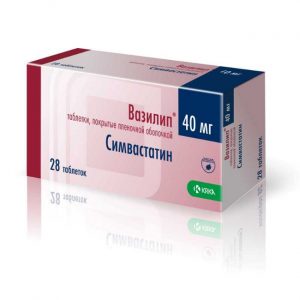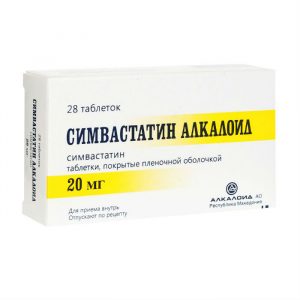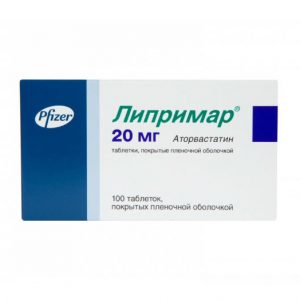Description
Latin name
Atorvastatin
Packing
30 pcs
Pharmacological action
Atorvastatin is a hypolipidemic agent from the group of statins.
According to the principle of competitive antagonism, the statin molecule binds to that part of the coenzyme A receptor where HMG-CoA reductase is attached. Another part of the statin molecule inhibits the conversion of hydroxymethylglutarate to mevalonate, an intermediate in the synthesis of cholesterol molecules.
Inhibition of the activity of HMG-CoA reductase leads to a series of sequential reactions, resulting in a decrease in the intracellular cholesterol content and a compensatory increase in the activity of LDL receptors and, accordingly, accelerated catabolism of LDL cholesterol.
Indications
Primary hypercholesterolemia with diet therapy failure, combined hypercholesterolemia and hypertriglyceridemia, heterozygous and homozygous familial hypercholesterolemia with diet therapy failure.
Contraindications
Active liver disease, increased serum transaminase activity more than 3 times of unknown origin, pregnancy, lactation (breastfeeding), hypersensitivity to atorvastatin.
Women of reproductive age who do not use reliable contraceptives.
Atorvastatin is contraindicated in pregnancy and lactation (breastfeeding).
Use during pregnancy and lactation
Atorvastatin is contraindicated during pregnancy and lactation (breastfeeding).
It is not known whether atorvastatin is excreted in breast milk. Given the possibility of adverse events in infants, if necessary, use of the drug during lactation should decide on the termination of breastfeeding.
Women of reproductive age should use adequate contraceptive methods during treatment.
Atorvastatin can be prescribed to women of reproductive age only if their probability of pregnancy is very low and the patient is informed about the possible risk of treatment for the fetus.
Composition
1 tablet contains:
Active ingredient:
atorvastatin calcium trihydrate
Excipients:
Calcium carbonate
MCC
StarKap1500 (corn starch and pregelatinized starch)
Silicon dioxide colloid sulphid (s) , talc, titanium dioxide, iron oxide dye yellow, iron dye oxide red).
Dosage and Administration
Inside.
Before prescribing Atorvastatin, the patient should be advised of a standard lipid-lowering diet, which he must continue to follow throughout the duration of therapy.
The initial dose is an average of 10 mg / day. The dose varies from 10 to 80 mg / day.
The drug can be taken at any time of the day with food or regardless of the meal time. The dose is selected taking into account the initial levels of cholesterol / LDL, the purpose of therapy and individual effect. At the beginning of treatment and / or during an increase in the dose of Atorvastatin, it is necessary to monitor plasma lipid levels every 2 4 weeks and adjust the dose accordingly.
To ensure the dosage regimen for the drug given below, it is possible to use the drug Atorvastatin in another dosage form: film-coated tablets, 10 mg and 20 mg. The maximum daily dose of the drug is 80 mg.
With simultaneous use with cyclosporine, the daily dose of atorvastatin should not exceed 10 mg.
Primary hypercholesterolemia and mixed hyperlipidemia. In most cases, a dose of 10 mg of Atorvastatin once a day is sufficient. A significant therapeutic effect is observed after 2 weeks, and the maximum therapeutic effect is usually observed after 4 weeks. With prolonged treatment, this effect persists.
Special patient groups
Impaired renal function. The use of the drug in patients with renal failure and kidney disease does not affect the level of atorvastatin in the blood plasma or the degree of decrease in cholesterol / LDL when it is used, therefore, changing the dose of the drug is not required.
Impaired liver function. With liver failure, the dose must be reduced.
Elderly patients. When using the drug in elderly patients, there were no differences in safety, efficacy, or achievement of the goals of lipid-lowering therapy in comparison with the general population.
Side effects of the
Nervous system: insomnia, dizziness, headache, asthenia, malaise, drowsiness, nightmares, paresthesia, peripheral neuropathy, amnesia, emotional lability, atyxenia, migraine nervosa, paralysis, migraine nervosa, parasitism, Hypesthesia, loss of consciousness.
From the sensory organs: amblyopia, tinnitus, dry conjunctiva, disturbance of accommodation, hemorrhage in the retina, deafness, glaucoma, parosmia, loss of taste, perversion of taste.
From the cardiovascular system: chest pain palpitations, symptoms of vasodilation, orthostatic hypotension, increased blood pressure, phlebitis, arrhythmia, angina pectoris.
From the hemopoietic system: anemia, lymphadenopathy, thrombocytopenia.
From the respiratory system: bronchitis, rhinitis pneumonia, dyspnea, exacerbation of bronchial asthma, nosebleeds.
From the digestive system: nausea, heartburn, constipation or diarrhea, flatulence, gastralgia, abdominal pain, decreased or increased appetite, dry mouth, belching, dysphagia, vomiting, stomatitis, esophagitis, glossitis, erosive and ulcerative lesions of the oral mucosa gastroenteritis, hepatitis, biliary colic, cheilitis, duodenal ulcer, pancreatitis, cholestatic jaundice, impaired liver function, rectal bleeding, melena, bleeding gums, tenesmus.
From the musculoskeletal system: arthritis leg cramps, bursitis, tendosynovitis, myositis, myopathy, arthralgia, myalgia, rhabdomyolysis, torticollis, muscle hypertonicity, joint contracture, swelling of the joints, tendonopathy (in some cases with tendon rupture).
From the genitourinary system: urogenital infections, peripheral edema <1% - dysuria (including pollakiuria, nocturia, urinary incontinence or urinary retention, imperative urination), leukocyturia, nephritis, hematuria, vaginal bleeding, nephroorrhosis , epididymitis, decreased libido, impotence, impaired ejaculation. Dermatological reactions: alopecia, xeroderma, photosensitivity, increased sweating, eczema, seborrhea, ecchymosis, petechiae. From the endocrine system: gynecomastia, mastodynia. From the side of metabolism: weight gain, exacerbation of gout. Allergic reactions: itching, skin rash, contact dermatitis, rarely urticaria, angioedema, facial edema, anaphylaxis, erythema multiforme exudative (including Stevens-Johnson syndrome), toxic epidermal necrolysis (Lyell’s syndrome). Laboratory indicators: hyperglycemia, hypoglycemia, increased serum CPK, albuminuria. Drug Interaction The risk of myopathy during treatment with other drugs in this class is increased with the concomitant use of cyclosporine, fibrates, erythromycin, antifungal agents, related to azoles, and nicotinic acid. Atorvastatin and magnesium and aluminum hydroxide suspensions co-administered with plasma atorvastatin decreased by approximately 35% at the same time, but the level of cholesterol / LDL was not changed. Atorvastatin does not affect the pharmacokinetics of antipyrine (phenazone) when administered concomitantly, so interaction with other agents metabolised by the same cytochrome isoenzymes is not expected. With concomitant administration of colestipol, plasma concentrations of Atorvastatin decreased by approximately 25%. However, the hypolipidemic effect of the combination of Atorvastatin and colestipol was superior to that of each drug individually. With repeated administration of digoxin and atorvastatin at a dose of 10 mg, the equilibrium concentrations of digoxin in the blood plasma did not change. However, when using digoxin in combination with Atorvastatin at a dose of 80 mg / day. the concentration of digoxin increased by about 20%. Patients receiving digoxin in combination with Atorvastatin should be observed. Atorvastatin and erythromycin (500 mg 4 times / day) or clarithromycin (500 mg 2 times / day), which inhibit cytochrome P450 3A4, were observed with concomitant administration of blood plasma. Atorvastatin (10 mg 1 time / day) and azithromycin (500 mg 1 time / day) concomitant plasma concentrations of atorvastatin did not change. Atorvastatin had no clinically relevant effect on the plasma concentrations of terfenadine, which is metabolized mainly by cytochrome P450 3A4 in this regard, it seems unlikely that Atorvastatin is able to significantly affect the pharmacokinetic parameters of other cytochrome P450 3A4 substrates. A significant increase of norethindrone and ethinylestradiol AUC by about 30% and 20%, respectively, was observed with the concomitant use of Atorvastatin and a contraceptive containing norethindrone and ethinylestradiol. This effect should be considered when choosing an oral contraceptive for a woman receiving Atorvastatin. Concomitant use with drugs that reduce the concentration of endogenous steroid hormones (including cimetidine, ketoconazole, spironolactone), increases the risk of reducing endogenous steroid hormones (caution should be exercised). No evidence of a clinically relevant interaction was observed in the study of the interaction of Atorvastatin with warfarin and cimetidine. Atorvastatin 80 mg and amlodipine 10 mg atorvastatin pharmacokinetics did not change at steady state. No clinically relevant undesirable interaction of Atorvastatin and antihypertensive agents was noted. The concomitant use of Atorvastatin with protease inhibitors known as cytochrome P450 3A4 inhibitors was accompanied by an increase in the plasma concentration of Atorvastatin. No known pharmaceutical compatibility. overdose Treatment: no specific antidote, symptomatic therapy is carried out. Hemodialysis is ineffective. Storage conditions In a dry, dark place at a temperature of no higher than 25 ° C. Expiration 2 years. Active substance Atorvastatin Pharmacy leave Po Dosage form dosage form tablets




